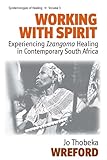Working with Spirit : Experiencing ‹i›Izangoma‹/i› Healing in Contemporary South Africa / Jo Thobeka Wreford.
Material type: TextSeries: Epistemologies of Healing ; 3Publisher: New York ; Oxford : Berghahn Books, [2008]Copyright date: ©2008Description: 1 online resource (184 p.)Content type:
TextSeries: Epistemologies of Healing ; 3Publisher: New York ; Oxford : Berghahn Books, [2008]Copyright date: ©2008Description: 1 online resource (184 p.)Content type: - 9781845454760
- 9780857450159
- 610.968 22
- online - DeGruyter
| Item type | Current library | Call number | URL | Status | Notes | Barcode | |
|---|---|---|---|---|---|---|---|
 eBook
eBook
|
Biblioteca "Angelicum" Pont. Univ. S.Tommaso d'Aquino Nuvola online | online - DeGruyter (Browse shelf(Opens below)) | Online access | Not for loan (Accesso limitato) | Accesso per gli utenti autorizzati / Access for authorized users | (dgr)9780857450159 |
Frontmatter -- Contents -- Acknowledgements -- Terminology -- Acronyms -- Introduction -- Chapter 1 Conversations in Anthropological Theory and Method -- Chapter 2 On the Question of Ancestors -- Chapter 3 Biomedicine and Izangoma Sinyanga— Fundamental Misunderstandings and Avoidable Mistakes -- Chapter 4 On “Being Called” (Ukubiswa) -- Illustrations -- Chapter 5 Graduation (Goduswa) and Ancestral Evidences -- Chapter 6 What Got into You? Ancestral En-trancement -- Chapter 7 “Long-nosed” Izangoma and Relationship Issues in the Izangoma Community -- Chapter 8 Witchcraft and Izangoma Sinyanga in the Time of AIDS -- Postscript and Final Thoughts -- Glossary of Terms -- Bibliography -- Index
restricted access online access with authorization star
http://purl.org/coar/access_right/c_16ec
In the current model of health dispensation in South Africa there are two major paradigms, the spirit-inspired tradition of izangoma sinyanga and biomedicine. These operate at best in parallel, but more often than not are at odds with one another. This book, based on the author’s personal experience as a practitioner of traditional African medicine, considers the effects of the absence of spirit in biomedicine on collaborative relationships. Given the unprecedented challenge of the HIV/AIDS epidemic in the country, the author suggests that more cooperation is vital. Taking a critical look at the role of anthropology in this endeavor, she proposes the development of a “language of spirit” by means of which the spirit-inspired aetiology of izangoma sinyanga may be made comprehensible to academic scientists and applicable to medical interventions. The author discusses white izangoma in the context of current debates on healing and hybridity and insists that there exists a powerful role for izangoma in the realm of societal healing. Above all, the book constitutes a start in what the author hopes will develop into an ongoing intellectual conversation between traditional African healing, academe, and biomedicine in South Africa.
Mode of access: Internet via World Wide Web.
In English.
Description based on online resource; title from PDF title page (publisher's Web site, viewed 25. Jun 2024)


